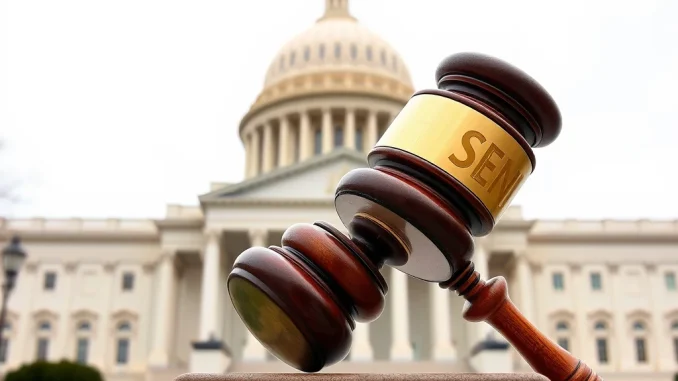
Heads up, finance enthusiasts! The Senate Banking Committee is gearing up for a pivotal vote this Thursday at 10 a.m. EST. This isn’t just another routine meeting; it’s a crucial session that could significantly shape the future landscape of financial regulation in the US. Reporter Eleanor Terrett broke the news on X, highlighting the key individuals in the spotlight. Let’s dive into who these nominees are and why this vote matters.
Why is the Senate Banking Committee Vote on Financial Nominees Important?
The Senate Banking Committee plays a vital role in overseeing the nation’s financial institutions and policies. Think of them as the financial watchdogs in Congress. Their decisions and the individuals they approve have far-reaching consequences for everything from your local bank to the global financial markets. This upcoming vote is particularly significant because it concerns nominations for top positions in key regulatory bodies. These roles are not just bureaucratic titles; they are positions of immense power and influence, capable of steering the direction of financial rules and enforcement.
Meet the Nominees: Shaping the Future of Finance
Let’s break down who’s on the docket for this Thursday’s vote. These are the individuals vying for crucial roles in shaping the financial world:
- Paul Atkins for SEC Chair: The Securities and Exchange Commission (SEC) is the primary agency responsible for enforcing securities laws and regulating the securities industry. The SEC Chair is at the helm, leading the charge in protecting investors, maintaining fair and orderly markets, and facilitating capital formation. Having a new chair can signal shifts in the SEC’s priorities and enforcement strategies.
- Jonathan Gould for Comptroller of the Currency: The Comptroller of the Currency (OCC) charters, regulates, and supervises all national banks and federal savings associations. The Comptroller of the Currency plays a critical role in ensuring the safety and soundness of the national banking system. This position is particularly relevant in today’s evolving financial landscape, especially with the rise of digital assets and fintech innovations.
- Luke Pettit for Assistant Treasury Secretary: The Department of the Treasury is responsible for a wide range of financial and economic matters. The Assistant Treasury Secretary plays a key role in advising the Secretary on economic policy and managing various aspects of the nation’s finances. This position can influence tax policy, international finance, and economic growth strategies.
- Marcus Molinaro for Federal Transit Administrator: While seemingly less directly related to finance, the Federal Transit Administration (FTA) is a significant part of the Department of Transportation, overseeing federal funding for public transportation systems. The Federal Transit Administrator impacts infrastructure spending and development, which indirectly influences economic activity and financial flows.
Why Should You Care About These Financial Nominees?
You might be thinking, “Why should I care about a Senate Banking Committee vote?” Well, these decisions trickle down and affect everyone, directly or indirectly. Here’s why this vote is more relevant than you might think:
- Impact on Financial Markets: The SEC and OCC directly regulate financial institutions and markets. Changes in leadership at these agencies can lead to shifts in regulatory focus, enforcement actions, and market sentiment. This can influence investment strategies and market volatility.
- Economic Policy Direction: The Assistant Treasury Secretary plays a role in shaping economic policy. Their views and priorities can influence government spending, tax policies, and the overall economic direction of the country.
- Regulation of Emerging Technologies: With the rise of cryptocurrencies and blockchain technology, the stance of the SEC Chair and the Comptroller of the Currency on digital assets is crucial. Their approach will shape the regulatory environment for these innovative technologies.
- Consumer Protection: These regulatory bodies are also responsible for consumer protection in the financial sector. Their actions impact how financial institutions treat consumers and ensure fair practices.
What are the Potential Implications of These Nominations?
The confirmation of these financial nominees could lead to several shifts in the regulatory landscape. Depending on the individuals and their policy stances, we might see:
| Nominee Position | Potential Implication |
|---|---|
| SEC Chair | Shift in focus on enforcement priorities (e.g., cryptocurrency regulation, insider trading), changes in rulemaking agenda. |
| Comptroller of the Currency | Changes in bank supervision approach, potential easing or tightening of regulations for national banks, approach to fintech and digital banking. |
| Assistant Treasury Secretary | Influence on economic policy direction, potential changes in fiscal policy recommendations, impact on international financial relations. |
| Federal Transit Administrator | Changes in infrastructure spending priorities, impact on public transportation projects, influence on related industries and economic development. |
Stay Tuned for Updates on the Financial Nominees Vote
This Thursday’s Senate Banking Committee vote is a key event to watch. The outcome will set the stage for financial regulation and policy for the foreseeable future. Keep an eye on news outlets and financial publications for real-time updates as the vote unfolds. We will also be providing updates and analysis as the situation develops. Understanding these processes is crucial for navigating the ever-changing world of finance and economics. Don’t underestimate the impact of these seemingly behind-the-scenes political processes on your financial well-being and the broader economy.
In Summary: The Senate Banking Committee’s vote on financial nominees is a significant event with potential ripple effects across the financial sector and beyond. From the SEC Chair to the Comptroller of the Currency, these roles are pivotal in shaping regulations, economic policy, and the future of finance. Stay informed and engaged to understand how these decisions might impact you.



